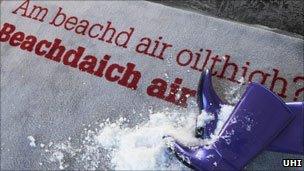UHI's long and difficult graduation
- Published

Amid the push for university status UHI has been heavily involved in medical research
BBC News Scotland online looks at some of the twists and turns in the prospective University of the Highlands and Islands' (UHI) journey towards gaining its full university title.
Ancient history haunts the fields where UHI's future lies.
Beechwood Farm in Inverness has been earmarked for an education and research campus, external which will provide a new base for the higher education institution.
Survey work and excavations, external carried out by Durham University archaeologists ahead of the development have uncovered prehistoric artefacts.
They included flints and fragments of Neothlic pottery suggesting the site was lived on and cultivated in prehistoric times.
UHI's effort to achieve full university status has its own complex and, at times, troubled past.
In 1991, Highland Regional Council set up a steering group to look into the case for a University of the Highlands and Islands.
Former principal of Strathclyde University, Sir Graham Hills, was commissioned to report on the best way forward and in 1992 the UHI project was started.
The following 14 years were punctuated with the employment of the first staff, the launch of research schools and an award of a £33m grant from the Millennium Commission.
A major blow came in October 2006 when the institution was told it would not attain full university status in 2007 - the Year of Highland Culture - as hoped.
The Quality Assurance Agency for Higher Education said more time was needed for the institute to become a university.
There was better news in 2008 when the Privy Council granted UHI taught-degree awarding powers.
In the autumn of the following year, a row blew up over the amount of public money committed to Beechwood's field of dreams.
Highlands and Islands Enterprise (HIE) was criticised over its plans to spend up to £25m on the campus.
The agency said the scheme - its "biggest project yet" - would create jobs and retain talent in the region.
But Western Isles Council - Comhairle nan Eilean Siar - said HIE should be investing in fragile areas of the region and not "booming" Inverness.
Leader Angus Campbell said giving so much to the campus was "embarrassing".
Blushes bloomed afresh in May this year when it emerged senior managers at UHI were being chauffeur-driven to meetings in central Scotland.
The institution confirmed a driver was hired "as and when required".
UHI said the move was more cost effective than train travel or hiring taxis, cars and paying for overnight accommodation.

UHI was the first higher education institution to publish a Gaelic language plan
It said managers were also able to continue working while being driven to and from meetings.
Troubles in the building industry as a result of the recession impacted on the campus project during the first cold days of December.
A major factor was the collapse of Rok, a construction firm with potential contracts with HIE worth £32m.
Though Rok did not have any deals related to the campus, HIE decided it should tighten its procurement procedures for the contract which is worth £15m-£20m.
This move has added an extra four months to the project.
Bolstering the effort to achieve full status has been UHI researchers' work on better understanding diabetes.
Last year, scientists studied the role of gluten in schizophrenia and diabetes and also links between the two illnesses.
Earlier this month it became the first higher education institution to publish a Gaelic language plan, external.
Given the long journey towards graduating as a university it probably comes as little surprise James Fraser, the UHI principal, said "it would be an understatement to say we are delighted" at the QAA's assessment.
But for now the champagne is on ice until a final decision is made by the Privy Council early next year.
- Published22 December 2010
- Published7 December 2010
- Published6 December 2010
- Published7 September 2010
- Published1 September 2010
- Published18 June 2010